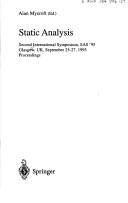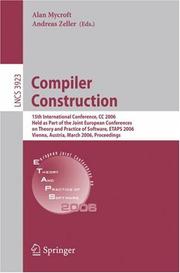| Listing 1 - 8 of 8 |
Sort by
|
Multi
ISBN: 9783540330516 Year: 2006 Publisher: Berlin Heidelberg Springer-Verlag GmbH
Abstract | Keywords | Export | Availability | Bookmark
 Loading...
Loading...Choose an application
- Reference Manager
- EndNote
- RefWorks (Direct export to RefWorks)
ETAPS 2006 was the ninth instance of the European Joint Conferences on Theory and Practice of Software. ETAPS is an annual federated conference that was established in 1998 by combining a number of existing and new conferences. This year it comprised ?ve conferences (CC, ESOP, FASE, FOSSACS, TACAS), 18 satellite workshops (AC- CAT, AVIS, CMCS, COCV, DCC, EAAI, FESCA, FRCSS, GT-VMT, LDTA, MBT, QAPL, SC, SLAP, SPIN, TERMGRAPH, WITS and WRLA), two tutorials, and seven invited lectures (not including those that were speci?c to the satellite events). We - ceived over 550 submissions to the ?ve conferences this year, giving an overall acc- tance rate of 23%, with acceptance rates below 30% for each conference. Congratu- tions to all the authors who made it to the ?nal programme! I hope that most of the other authorsstill founda way of participatingin this excitingevent and I hope you will continue submitting. The events that comprise ETAPS address various aspects of the system devel- ment process, including speci?cation, design, implementation, analysis and impro- ment. The languages, methodologies and tools which support these activities are all well within its scope. Di?erent blends of theory and practice are represented, with an inclination towards theory with a practical motivation on the one hand and soundly based practice on the other. Many of the issues involved in software design apply to systems in general, including hardware systems, and the emphasis on software is not intended to be exclusive.
Mathematical logic --- Computer science --- Artificial intelligence. Robotics. Simulation. Graphics --- Computer. Automation --- programmeren (informatica) --- wiskunde --- software engineering --- KI (kunstmatige intelligentie) --- logica --- robots --- AI (artificiële intelligentie)
Dissertation
Year: 1981 Publisher: Edinburgh : University of Edinburgh, Department of Computer Science,
Abstract | Keywords | Export | Availability | Bookmark
 Loading...
Loading...Choose an application
- Reference Manager
- EndNote
- RefWorks (Direct export to RefWorks)
Book
ISBN: 9781617291999 1617291994 Year: 2015 Publisher: Shelter Island: Manning,
Abstract | Keywords | Export | Availability | Bookmark
 Loading...
Loading...Choose an application
- Reference Manager
- EndNote
- RefWorks (Direct export to RefWorks)
Every new version of Java is important, but Java 8 is a game changer. Java 8 in Action is a clearly written guide to the new features of Java 8. It begins with a practical introduction to lambdas, using real-world Java code. Next, it covers the new Streams API and shows how you can use it to make collection-based code radically easier to understand and maintain. It also explains other major Java 8 features including default methods, Optional, CompletableFuture, and the new Date and Time API. This book is written for programmers familiar with Java and basic OO programming. -- Provided by publisher.
Java (Computer program language) --- Java (Langage de programmation) --- Java 8 --- software --- Object-oriented programming languages --- JavaSpaces technology
Book
ISBN: 9783540330516 Year: 2006 Publisher: Berlin Heidelberg Springer Berlin Heidelberg
Abstract | Keywords | Export | Availability | Bookmark
 Loading...
Loading...Choose an application
- Reference Manager
- EndNote
- RefWorks (Direct export to RefWorks)
ETAPS 2006 was the ninth instance of the European Joint Conferences on Theory and Practice of Software. ETAPS is an annual federated conference that was established in 1998 by combining a number of existing and new conferences. This year it comprised ?ve conferences (CC, ESOP, FASE, FOSSACS, TACAS), 18 satellite workshops (AC- CAT, AVIS, CMCS, COCV, DCC, EAAI, FESCA, FRCSS, GT-VMT, LDTA, MBT, QAPL, SC, SLAP, SPIN, TERMGRAPH, WITS and WRLA), two tutorials, and seven invited lectures (not including those that were speci?c to the satellite events). We - ceived over 550 submissions to the ?ve conferences this year, giving an overall acc- tance rate of 23%, with acceptance rates below 30% for each conference. Congratu- tions to all the authors who made it to the ?nal programme! I hope that most of the other authorsstill founda way of participatingin this excitingevent and I hope you will continue submitting. The events that comprise ETAPS address various aspects of the system devel- ment process, including speci?cation, design, implementation, analysis and impro- ment. The languages, methodologies and tools which support these activities are all well within its scope. Di?erent blends of theory and practice are represented, with an inclination towards theory with a practical motivation on the one hand and soundly based practice on the other. Many of the issues involved in software design apply to systems in general, including hardware systems, and the emphasis on software is not intended to be exclusive.
Mathematical logic --- Computer science --- Artificial intelligence. Robotics. Simulation. Graphics --- Computer. Automation --- programmeren (informatica) --- wiskunde --- software engineering --- KI (kunstmatige intelligentie) --- logica --- robots
Book
Year: 1983 Publisher: Edinburgh University of Edinburgh. Department of artificial intelligence
Abstract | Keywords | Export | Availability | Bookmark
 Loading...
Loading...Choose an application
- Reference Manager
- EndNote
- RefWorks (Direct export to RefWorks)
Book
ISBN: 9781638356974 1638356971 Year: 2019 Publisher: Shelter Island : Manning Publications,
Abstract | Keywords | Export | Availability | Bookmark
 Loading...
Loading...Choose an application
- Reference Manager
- EndNote
- RefWorks (Direct export to RefWorks)
Modern Java in Action connects new features of the Java language with their practical applications. Using crystal-clear examples and careful attention to detail, this book respects your time. It will help you expand your existing knowledge of core Java as you master modern additions like the Streams API and the Java Module System, explore new approaches to concurrency, and learn how functional concepts can help you write code that’s easier to read and maintain.

ISBN: 3540603603 0387603603 3540450505 9783540603603 Year: 1995 Volume: 983 Publisher: Berlin: Springer,
Abstract | Keywords | Export | Availability | Bookmark
 Loading...
Loading...Choose an application
- Reference Manager
- EndNote
- RefWorks (Direct export to RefWorks)
This book constitutes the refereed proceedings of the Second International Symposium on Static Analysis, SAS '95, held in Glasgow, UK, in September 1995. Static Analysis is increasingly recognized as a foundation for high-performance implementations and verification systems of high-level programming languages. 22 full revised papers selected from a total of 55 submissions are presented; they address static analysis issues for different programming paradigms; in particular concurrent, constraint, functional, imperative, logic, and object-oriented programming are addressed. In addition there are abstracts or full papers for three invited presentations and two system descriptions.
Computer programming --- Programming languages (Electronic computers) --- Programmation (Informatique) --- Langages de programmation --- Congresses. --- Congresses --- Congrès --- Congrès --- Electronic digital computers --- Programming --- Software engineering. --- Information theory. --- Computer science. --- Logic design. --- Software Engineering/Programming and Operating Systems. --- Theory of Computation. --- Programming Techniques. --- Software Engineering. --- Programming Languages, Compilers, Interpreters. --- Logics and Meanings of Programs. --- Design, Logic --- Design of logic systems --- Digital electronics --- Electronic circuit design --- Logic circuits --- Machine theory --- Switching theory --- Informatics --- Science --- Communication theory --- Communication --- Cybernetics --- Computer software engineering --- Engineering --- Computer programming - Congresses --- Programming languages (Electronic computers) - Congresses.

ISSN: 03029743 ISBN: 9783540330509 354033050X 3540330518 Year: 2006 Volume: 3923 Publisher: Berlin: Springer,
Abstract | Keywords | Export | Availability | Bookmark
 Loading...
Loading...Choose an application
- Reference Manager
- EndNote
- RefWorks (Direct export to RefWorks)
ETAPS 2006 was the ninth instance of the European Joint Conferences on Theory and Practice of Software. ETAPS is an annual federated conference that was established in 1998 by combining a number of existing and new conferences. This year it comprised ?ve conferences (CC, ESOP, FASE, FOSSACS, TACAS), 18 satellite workshops (AC- CAT, AVIS, CMCS, COCV, DCC, EAAI, FESCA, FRCSS, GT-VMT, LDTA, MBT, QAPL, SC, SLAP, SPIN, TERMGRAPH, WITS and WRLA), two tutorials, and seven invited lectures (not including those that were speci?c to the satellite events). We - ceived over 550 submissions to the ?ve conferences this year, giving an overall acc- tance rate of 23%, with acceptance rates below 30% for each conference. Congratu- tions to all the authors who made it to the ?nal programme! I hope that most of the other authorsstill founda way of participatingin this excitingevent and I hope you will continue submitting. The events that comprise ETAPS address various aspects of the system devel- ment process, including speci?cation, design, implementation, analysis and impro- ment. The languages, methodologies and tools which support these activities are all well within its scope. Di?erent blends of theory and practice are represented, with an inclination towards theory with a practical motivation on the one hand and soundly based practice on the other. Many of the issues involved in software design apply to systems in general, including hardware systems, and the emphasis on software is not intended to be exclusive.
Compilers (Computer programs) --- Compilateurs (Logiciels) --- Congresses. --- Congrès --- Computer Science --- Engineering & Applied Sciences --- Computer science. --- Software engineering. --- Programming languages (Electronic computers). --- Operating systems (Computers). --- Computer logic. --- Mathematical logic. --- Artificial intelligence. --- Computer Science. --- Logics and Meanings of Programs. --- Programming Languages, Compilers, Interpreters. --- Operating Systems. --- Mathematical Logic and Formal Languages. --- Software Engineering. --- Artificial Intelligence (incl. Robotics). --- AI (Artificial intelligence) --- Artificial thinking --- Electronic brains --- Intellectronics --- Intelligence, Artificial --- Intelligent machines --- Machine intelligence --- Thinking, Artificial --- Bionics --- Cognitive science --- Digital computer simulation --- Electronic data processing --- Logic machines --- Machine theory --- Self-organizing systems --- Simulation methods --- Fifth generation computers --- Neural computers --- Algebra of logic --- Logic, Universal --- Mathematical logic --- Symbolic and mathematical logic --- Symbolic logic --- Mathematics --- Algebra, Abstract --- Metamathematics --- Set theory --- Syllogism --- Computer science logic --- Logic, Symbolic and mathematical --- Computer operating systems --- Computers --- Disk operating systems --- Systems software --- Computer languages --- Computer program languages --- Computer programming languages --- Machine language --- Languages, Artificial --- Computer software engineering --- Engineering --- Informatics --- Science --- Operating systems --- Logic design. --- Artificial Intelligence. --- Design, Logic --- Design of logic systems --- Digital electronics --- Electronic circuit design --- Logic circuits --- Switching theory --- Compiler construction --- CC --- Compilers (Computer programs) - Congresses --- Compilers (Computer programs). --- Machine theory. --- Computer Science Logic and Foundations of Programming. --- Compilers and Interpreters. --- Formal Languages and Automata Theory. --- Abstract automata --- Abstract machines --- Automata --- Mathematical machine theory --- Algorithms --- Recursive functions --- Robotics --- Compiling programs (Computer programs) --- Computer programs --- Programming software
| Listing 1 - 8 of 8 |
Sort by
|

 Search
Search Feedback
Feedback About UniCat
About UniCat  Help
Help News
News